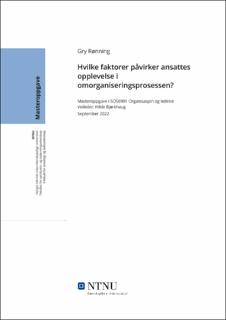Hvilke faktorer påvirker ansattes opplevelse i omorganiseringsprosessen?
Master thesis
Permanent lenke
https://hdl.handle.net/11250/3039137Utgivelsesdato
2022Metadata
Vis full innførselSamlinger
Sammendrag
Årsaker til motstand og reaksjoner på endring i organisasjonen er tema som har fasinert meg i ulike lederroller. Samtidig opplever vi at samfunnet er i konstant endring, og det er en forventning at bedrifter og organisasjoner må omstille seg for å være attraktive. Det er mange teoretikere som forsøker å forklare hvorfor årsaker til motstand oppstår, men litteraturen beskrives ofte motstand mot endring ensidig fra endringslederens perspektiv. Nyere forskning peker på kunnskap fra flere perspektiv for å forstå problemet.
Med dette utgangspunktet ønsker jeg å kartlegge hvordan omorganisering oppleves av ansatte i et helseforetak, der vedtak om et felles akuttsykehus har ført til politisk motstand, uro og splittelse i befolkningen. Oppgavens problemstilling er som følger: Hvilke faktorer påvirker ansattes opplevelse i omorganiseringsprosess?Datamaterialet er samlet inn gjennom en spørreundersøkelse. Spørsmålene er kategorisert og analysert under tema omorganisering, informasjon, årsaker til motstand og grad av motstand.Funnene viser i korte trekk at ansatte er positive til å samle pasienter og fagmiljø, for å sikre trygge pasientforløp og arbeide i robuste attraktive fagmiljø. De tror at fellessykehuset vil gi muligheter for et bedre samarbeid mellom kommunene i fremtiden. De beskriver også at grunnen til at de valgte å arbeide ved sykehusene fortsatt er tilstede etter at nytt sykehus står ferdig, men at forutsetningene ved å arbeide der blir annerledes. Når det gjelder motstand mot endring, så opplever mange usikkerhet rundt egen arbeidssituasjon, og dette gir ulike former for reaksjoner. Det viser seg at ansattes reaksjoner kan graderes på ulike nivå og på den måten vil den peke på hvor tiltak bør iverksettes. Opplevelsen av mangel på informasjon er et sentralt funn, men det er usikkert hvorfor informasjon ikke når frem. Resultatene av analysen er diskutert og drøftet i lys av teorier om, årsaker til motstand, reaksjoner på endring, og endringsledelse. Causes of resistance and reactions to changes in the organization are topics that have fascinated me in various leadership roles. At the same time, we experience that society is constantly changing, and there is an expectation that companies and organizations must adapt to be attractive.Many theorists try to explain why causes of resistance arise, but the literature often describes resistance to change unilaterally from the perspective of the change leader. Recent research points to knowledge from several perspectives to understand the problem.With this starting point, I want to map how reorganization is experienced by employees in a healthcare company, where the decision to establish a joint emergency hospital has led to political opposition, unrest, and division in the population. The task's problem is as follows:What factors influence the employee experience in the reorganization process?The data was collected through a survey. The questions are categorized and analyzed under the themes of reorganization, information, reasons for resistance and degree of resistance.In short, the findings show that employees are positive about bringing patients and the professional environment together, to ensure safe patient processes and work in a robust and attractive professional environment. They believe the community hospital will provide opportunities for better cooperation between the municipalities in the future. They also describe that the reason they chose to work at the hospitals is still present after the new hospital is completed, but that the conditions for working there will be different. When it comes to resistance to change, many people experience uncertainty about their work situation, and this gives rise to different forms of reactions.It turns out that employees' reactions can be graded at different levels and in this way it will be pointed out where measures should be put in place. The experience of a lack of information is a central finding, but it is uncertain why information is not forthcoming.The results of the analysis are discussed and debated in the light of theories about, causes of resistance, reactions to changes and change management.
